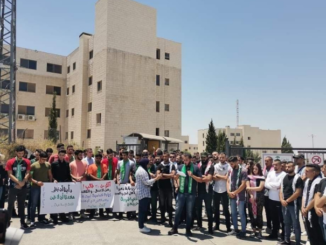
By Marcelo Svirsky
Led by Palestinian leaders in Israel, on August 11 tens of thousands gathered in Tel Aviv to protest the nation-state Law that formally brands the inferior status of the Palestinian citizens. The law was passed by the Knesset on July the 19th. On the background, two days before the protest, the Israeli air force bombed and destroyed Gaza’s only cultural center. In an earlier airstrike, 23-year-old Inas Hamrash, pregnant, and her year-and-a-half-old daughter, Bayan, were killed in the area of Dir al-Balah in Central Gaza. It appeared that enough Palestinian blood was shed in this round, as Israel agreed to a ceasefire with Hamas. Anchoring in law the structural discrimination of the Palestinian citizens on the one hand, and keeping up with the policy of making Palestinian Gazans die on the other hand – are two aspects of the multifaceted more-than-a-century long Zionist project of Indigenous elimination in Palestine.
It is never enough to remind readers that this has never been a top-down approach but rather a popular movement where regular Israelis approve policies by taking an active and enthusiastic everyday role in this project. Daniel Jonah Goldhagen’s phrase of “willing executioners” comes to mind. Being Zionist goals widely held among Israelis is what makes fighting them very difficult.
Indeed, as the Palestinian people know all too well, struggling with Zionist machinations is everything but simple. But it does happen that evil makes bad moves. In such cases, assuming we are able to identify the mistakes, the aim is, accordingly, to strategize the advantages. That’s perhaps the case with the nation-state Law.
There are basically three types of opposition to the nation-state Law. The first is the principled: the law is to be opposed because of the nationalistic-segregationist values it enshrines. The second is the seemingly practical: the law is to be opposed because it may empty the judiciary from a minimum of legal tools to outlaw governmental discrimination against Palestinian citizens. This second type of opposition is blind to the historical fact that discrimination against Palestinians in Israel has always been intentional and structural; that is, so far discrimination did quite well without the expected added value that this particular law proclaims. The third type of opposition, held by many amongst those Israelis who oppose the law, is the delusional: the law is to be opposed because it jeopardizes the democratic character of the state and enacts Israel as an apartheid state.
From the various reports published in social media and political platforms, it is safe to claim that at the Tel Aviv protest there was no consensus among the demonstrators regarding the reasons to protest against the nation-state law. On the one hand, Palestinian demonstrators were protesting a law that makes their presence on the land, null.
On the other hand, Haaretz’ publisher Amos Shocken, invited to deliver a speech at the rally at the astonishment of most demonstrators, represented the delusional type of opposition to the law. In his speech, Shocken invoked the 1948 Israeli declaration of independence in which the new state promised equality and freedom to all, the same state that at the time of the declaration was fully invested in a campaign to ethnically cleanse the Palestinian people as a condition to its emergence. Delusional Shocken added that “we must unite in order to guarantee that in Israeli democracy, equal rights among civilians will be the basis for everything”, and that the country is ominously “getting further away from the…definition as Jewish and democratic”. Which “Israeli democracy” Shocken was referring to, we can only wonder. Shocken is just the tip of the Ashkenazi melting iceberg, but he does represent the position of those pseudo-liberal Israelis who are truly alarmed that the nation-state Law might trigger some form of world reaction that would shake their comfortable reality. They don’t really oppose the essence of the law (the Zionist left was never against the idea and practice of a Jewish state) but they fear its performative capacity to change how their existence looks like from now onwards.
They prefer a de-facto apartheid state that guarantees Jewish privileges but doesn’t name itself apartheid and instead pretends to be a democracy in which they can consecrate themselves as liberal champions. In a de-jure apartheid state that closes the gap between the normative (and historical) and the legal, thus exposing Jewish privileges to be seen for what they are, there is little room for pseudo-liberal language maneuvers. The nation-state Law is the distilled expression of what Israel has always been, so one must raise more than an eyebrow when people who essentially never opposed the Jewish state, oppose now its full legal manifestation. This is why the Shocken type of opposition to the nation-state Law is delusional only at the level of its expression, but it is malicious at the level of its passions and intents.
This discussion brings us to wonder, tactically, do we must oppose the law? Letting the law to run its own course may bear some benefits for the Palestinian cause. To begin with, the law puts behind the mind-numbing, frustrating and self-contained quarrel about what Israel is. As explained above, in the race between the two, the law has gotten now the norm, and Israel is not only de facto but also de-jure an apartheid state.
We can finally rescind from all those tedious discussions with Israelis and their supporters about Israel being the only democracy in the middle-east. The new law perfectly endorses the infamous but exact saying that “Israel is democratic for Jews and Jewish for Palestinians”. Putting the argumentation about Israel’s character to bed with a win on our side is a true asset. We can now focus just on gathering the evidence, without the cacophony of Israeli propaganda.
Secondly, as feared by the pseudo-liberals in Israel, as a direct reaction to this new legal definition of the state, there has been a wave of critique from the international community. The law has also been criticised by Jewish communities outside Israel, and not just in the Western world. Having new allies in the struggle to delegitimize Israel’s oppression of the Palestinian people is certainly a blessing. In the long run, the aim is to truly reach the threshold of worldwide criticism needed to place the Palestinian struggle at a “South-African moment”.
Thirdly, the new wave of the international critique against the nation-state Law has the potential to unlink between the critique of Israel in itself and the claim of anti-Semitism. Beyond the ultra-nationalist-machoism that motivated Israeli legislators, Netanyahu probably had in mind that fully equating Israel with Jewishness would serve the cause of defaming critics of Israel as anti-Semites. But Netanyahu’s over-confidence and twisted politics prevent him from seeing that the law, in fact, does the opposite: precisely because it brushed away the pseudo-democratic tune that served Israel so well up until now, the law is drawing world attention to the harmony between Israel’s policies towards the Palestinian people and its now official definition. On this background, the logic and appeal of the “anti-Semitism claim” are diluted. Reacting to the Tel Aviv rally, Netanyahu said that “Many of the demonstrators want to turn Israel into an Israeli-Palestinian state or a state of all its citizens. It is for precisely this we passed the nation-state law”.
His obtuseness to his own words is very telling. The Palestinian critique of Israel has never been anti-Semitic but has always been directed at Israel’s rejection of equality, as expressed by Netanyahu himself. Weakening the illegitimate connection between the critique of Israel and anti-Semitism would help legitimizing and snowballing BDS campaigns worldwide. Isn’t that enough to support the law?
Fourthly, on the internal front, as we witness an increase in public animosity against Palestinian citizens that the new law unleashed, the nation-state Law offers a new opportunity for Zionist pseudo-liberals to become truly democratic. While some may be embracing the new opportunity to come out of the closet and proudly adhere to apartheid, others may find the new situation unbearable enough to rethink their values and commitments.
This is because the law inaugurates a new threshold: without the “Israel is a democracy that needs fixing” toy to play with, pseudo-liberals support of Zionism appears in its full glory as apartheid-ism. In fact, this new state of affairs expresses the end, the final demise of the Zionist left, bereft now of its devices. Good riddance. Without their phony “Jewish and democratic” always limiting and restricting true collaboration, the road is free to build a new Palestinian-Israeli alliance, led by Palestinians and by what really matters in this conflict.
Fifthly, still, on the internal front, the nation-state Law transforms the meaning of the presence of Palestinian MKs in the Knesset. Under the new law, the margins of what they can say and do in the legislative have been narrowed to the point that they have been made almost redundant. This is the perfect time to rethink their role in Israeli politics. As I have repeatedly suggested, this is the time to consider withdrawing from official Israeli politics to make room for a new form of politics that takes into account the vision of the one democratic state from the Mediterranean Sea to the Jordan River.
Sixthly and finally, we must ask what is to be gained from repelling the law? If the petitions against the law succeed and the Supreme Court rules to annul the law, we will be back into the wonderland of the “Jewish and democratic” where one can speak of the Israeli democracy, of its declaration of independence, and of the peace process. In what sense this would serve the Palestinian cause?
I’d even dare to claim that the legal struggle against the law misses the wider strategic political point at issue here: though we will be able to compare situations only in few months’ time at the very least, given the global critique against the law, it makes sense to argue that under the new legal constellation it will be much harder for Israel to deny its real apartheid character. There is much to profit out of that situation, particularly in terms of new UN resolutions invoking the crime of apartheid as defined in article 7 of the 2002 Rome Statute of the International Criminal Court, resolutions that may well lead the way to international sanctions against Israel.
Thus, as a corollary of these notes, I’d like to suggest to the various Israeli NGOs and to the Arab Higher Monitoring Committee to withdraw their petitions against the law at the Supreme Court. In balance, it appears that there may be way more benefits in letting the law and their supporters to enjoy themselves.
– Marcelo Svirsky is a Senior Lecturer at the School for Humanities and Social Inquiry, University of Wollongong, Australia. He researches settler-colonial societies particularly Israel-Palestine and focuses on questions of social transformation and decolonization. He contributed this article to PalestineChronicle.com







